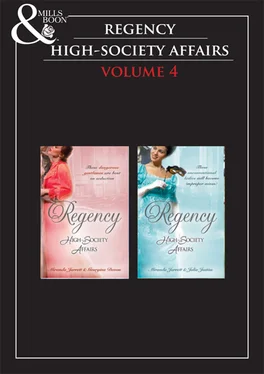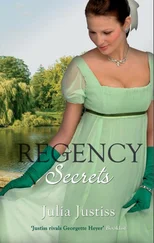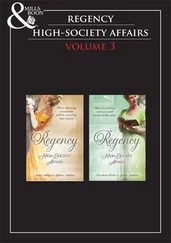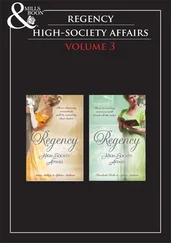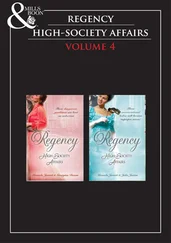Though Jerusa had seen such houses all her life, she’d only seen them from a distance, usually from the window of her parents’ carriage, and while Michel and Isaac led the horses toward the barnyard, she eagerly followed Mr. Faulk through the open door of the little house. On the threshold she paused for her eyes to grow accustomed to the murkiness, for while it was still afternoon out-of-doors, the sun scarcely penetrated inside the house, and there was little light beyond what filtered through the small-paned windows and the glow from the embers in the fireplace. The entire first floor seemed to be only this single room, a parlor, kitchen and bedchamber combined into one, with the sagging, curtainless bedstead in the far corner.
“On yer feet, Bess, we’ve guests,” ordered Faulk sharply. “This be Mistress Geary, and she and her husband be stopping here on their journey to—where’d ye say yer was bound, mistress?”
“South,” said Jerusa faintly. Did the house really smell so much like the yard outside, or was it her own clothing that still carried the scent of the barn where she’d spent last night?
“South,” repeated Faulk with as much relish as if Jerusa had said London. “Now offer the lady some of yer cider, Bess, and be quick about it.”
“Ah, don’t ye be giving me orders, Abraham, ‘specially not before a stranger.” The woman came forward from where she’d been bending over a pot on the fire, wiping her hands on her apron. She was small and round, and clenched in her teeth was a white clay pipe, whose bowl glowed bright before her cheek. “Good day to ye, Mistress Geary, and pleased I am to have ye in my home.”
“Thank you, Mrs. Faulk,” said Jerusa quickly. “But before, uh, Mr. Geary joins us, there’s something I must say to you alone that—”
“Ah, do yer husband be as full of his own wind and worth as mine, then?” The other woman laughed merrily, the embers in her pipe bobbing. “Ordering ye not to speak less’n it pleases him?”
Faulk snorted. “As it should be, Bess.”
“And as it never will be,” said Bess tartly, “least not in this house, Abraham!”
“Please, Mrs. Faulk, a word—”
“Pray, mistress, be seated before ye begin, and I’ll fetch ye a cup of my own cider. Some say it’s the best in this county or the next.”
Swiftly Jerusa perched on one corner of a bench before the trestle table. “Please, Mrs. Faulk, there’s something I would say to you that I’d rather Mr. Geary didn’t hear. You see, I’m not—”
“Not what, sweetheart?” asked Michel as his shadow filled the doorway. “You know we’ve no secrets between us. What, then, did you wish to tell these good people?”
Jerusa only stared at Michel in rebellious silence. She still meant to tell the Faulks who she was, but now she’d have to do it before him, as well.
Not that Michel seemed the least bit discomfited, continuing on as if nothing were amiss. “I’m honored, Mrs. Faulk, to be welcome in your home,” he said, gallantly bowing over the woman’s hand as she held Jerusa’s cider with the other. “How fortuitous that your husband came upon us!”
Mrs. Faulk giggled and simpered, and Jerusa watched with disgust. Oh, the Frenchman was handsome enough, but not so fair as to merit that degree of foolishness.
“Oh, Abraham prowls our land like a wolf himself,” said Mrs. Faulk as, at last, she took back her fingers. “He must, ye know, to guard the flocks. Why, at market yesterday he heard of a man north of here lost a dozen prime ewes to thieves!”
“Nay, Bess, but that’s not the best tale I brought home to ye!” said Faulk eagerly as he put a battered pewter tankard of rum and water into Michel’s hand. “Tell them what I told ye first!”
“Oh, ye mean about the heiress what jilted her bridegroom!” The pipe in Mrs. Faulk’s mouth bounced more fiercely. “Ye might not have heard this, ye being travelers, but two days ago a lass from one of the best families in Newport changed her mind and left her poor groom and half the town waiting alone before the minister! Jilted the man cold, she did, without leaving one word to comfort him.”
“That’s not true!” cried Jerusa, leaping to her feet. “I didn’t jilt him, I swear!”
The only sound in the room was the pop and hiss of the fire.
Mrs. Faulk cleared her throat. “Not to shame ye, Mistress Geary,” she said gently, “but ye must be mistaken. This girl we be speaking of is gentry, Captain Gabriel Sparhawk’s daughter.”
Faulk glanced uneasily from Michel to Jerusa. “True enough, mistress. I’ve seen Miss Sparhawk once with my own eyes, riding through the streets in Newport in an open carriage, a wonderfully proud beauty covered with pearls and plumes, like a very princess. And though you be a fine enough lady, mistress, ye don’t be her.”
“But I am her!” cried Jerusa indignantly. She’d never considered that they’d doubt who she was. “You must believe me because it’s true! I couldn’t possibly have jilted poor Tom the way you said, because I was kidnapped instead, carried away from my own house by that man!”
She swung around to point at Michel, half expecting him to turn and flee. What else could a man as low as a kidnapper do?
But Michel didn’t run away. He didn’t even look guilty. Instead, with a low sigh, he set the tankard with the rum on the table beside him and came to stand before Jerusa, his arms folded across his chest.
“Sweetheart, please,” he said softly. “You promised.”
“I never promised you anything!” answered Jerusa scornfully. “You’re a villain, a rogue, a kidnapper, and I hope they hang you for all the grief you’ve brought my family!”
He sighed again, all resignation and patient sorrow. “My dear, the Sparhawks are not your family. Your parents live in Charlestown, not Newport, and you can’t have jilted your bridegroom because you’ve been wed to me these last three years.”
“That’s not true, none of it!” Fighting her panic, Jerusa turned from Michel to the worried, fearful faces of the Faulks. “Surely you’ll believe me and take me back home! You must believe me! This man isn’t my husband. He isn’t even Mr. Geary!”
“Be easy now, mistress,” said Mrs. Faulk cautiously. “Faith, I’d never have told ye the scandal if I’d known it would strike ye like this.”
“But I am Jerusa Sparhawk!” Jerusa pressed her hands to her cheeks, desperate for the words that would make them believe her. Without the silk gowns and jewelry that had made such an impression on Faulk, words were all she had. “Gabriel Sparhawk’s my father and Mariah Sparhawk’s my mother. You’ve only to look at me to know it’s true! I was born on the twelfth of April in 1750, the same day as my twin brother Josh, and I’ve two older brothers and two younger sisters besides, and, oh, everyone in Newport would know me. Everyone!”
Yet one look at the Faulks’ faces told her they didn’t.
“Please, please believe me!” she pleaded. “I need your help to return to my family!”
“I didn’t hear nothing about a kidnapping,” said Faulk with exaggerated care, staring somewhere past Jerusa’s shoulder to avoid meeting her gaze. “Only that the bridegroomhisself swore he’d been left, and that that be the end of the match for him.”
“Tom said that?” Jerusa shook her head, unable to accept such blasphemy. Even in nightmares, life didn’t take such dreadful twists, and she felt herself sliding helplessly into the depths of her fear. “No, not my darling Tom! I love him, and he loves me. You must be wrong. You must be!”
“She’s unsettled, that’s all,” explained Michel with a sorrow so genuine it left Jerusa speechless. There was a warmth to his eyes, a tenderness softening his hard-edged face that seemed too heartfelt to be playacting, and in spite of everything else he’d done to her, she felt the color warm her cheeks. She could, in that instant, almost believe he cared for her. Yet how could he be so sympathetic when all of what he said were lies?
Читать дальше
